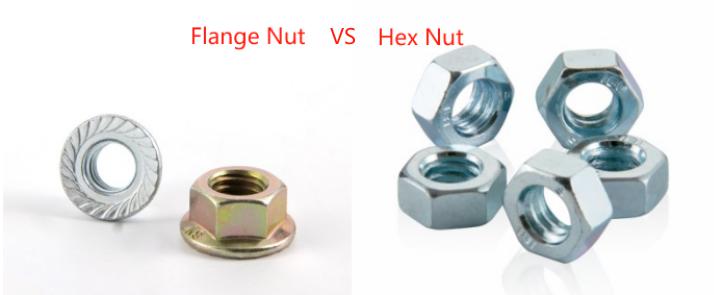Flange Nut vs Hex Nut: Which One Should You Use?
When you’re working on a project that needs bolts and nuts, the type of nut you pick can make a big difference. Two of the most common options are the flange nut and the hex nut. They may look similar at first glance, but they each have their own strengths, especially when it comes to structure, performance, and cost.
As a professional nut manufacturer, Xinchi is happy to share the key differences between the flange nut and the hex nut, so that you can choose the right one for the job.

Flange Nut vs Hex Nut: What’s the Structural Difference?
A hex nut is your standard six-sided nut. It’s simple, widely used, and usually works together with a washer to spread out the load and protect the surface underneath. You’ll see it everywhere—from furniture to machinery—because it’s versatile and affordable.
On the other hand, a flange nut comes with a wide, flat base (the “flange”) built right into the nut. This design gives it a bigger surface area, so it can spread pressure more evenly without needing a washer. Some flange nuts also come with serrated edges under the flange, which helps grip the surface and resist loosening from vibrations.
Flange Nut vs Hex Nut: Installation Efficiency
If you’re dealing with flange nuts, installation can be quicker and easier, especially on production lines. That’s because the built-in flange removes the extra step of placing a washer, and the serrated version helps lock the nut in place naturally. This makes flange nuts popular in automotive manufacturing and industrial equipment.
Hex nuts, in contrast, usually need to be paired with a separate washer and sometimes even a lock washer or thread locker. This gives you more flexibility, but it also means more parts and longer assembly time. If you’re after speed and convenience, flange nuts win here. But if you need a more modular setup where you can mix and match parts, hex nuts are a good bet.
Flange Nut vs Hex Nut: Cost Considerations
When it comes to budget, hex nuts are generally cheaper. Their basic design and wide availability keep prices low, making them a great option when you’re buying in bulk for general use.
Flange nuts, due to their integrated flange and sometimes serrated design, are a bit more expensive. But that higher price can pay off in the long run by saving time on installation and providing better performance in demanding applications. If your goal is short-term cost savings, go with hex nuts. If you’re thinking about overall efficiency, flange nuts could be the smarter choice.
Flange Nut vs Hex Nut: Anti-Loosening Performance
One of the biggest advantages of flange nuts, especially serrated flange nuts, is their ability to resist loosening under vibration. The serrated edge digs into the surface, making it harder for the nut to shake loose—perfect for engines, heavy machinery, and vehicles.
Hex nuts, by themselves, don’t offer the same level of resistance. They usually rely on external parts, like lock washers or nylon inserts, to stay in place. So, if you’re working on something that vibrates a lot, like a car or a generator, flange nuts are the more secure choice.
Flange Nut vs Hex Nut: Which One Fits Your Application?
Use flange nuts if you’re working in environments with vibration, like automotive engines or power equipment. They’re also great when you want to skip using a washer but still need strong, even pressure distribution.
Use hex nuts in general-purpose setups like construction, furniture assembly, or electronics—places where vibration isn’t a major concern and keeping costs low matters more.
Final Thoughts: Flange Nut or Hex Nut?
So, what’s the bottom line?
If you’re looking for speed, strength, and anti-vibration performance, flange nuts are the way to go. They’re especially useful in high-stress, high-speed production environments.
But if you’re prioritizing flexibility, cost-effectiveness, and simplicity, you can’t go wrong with a hex nut.
At Xinchi Fasteners, we supply both flange nuts and hex nuts in a wide range of sizes, finishes, and materials. Whether you need DIN 6923 flange nuts for automotive use or standard hex nuts for general construction, our products are built to perform and backed by professional support.
XINCHI is a trustworthy fastener company, especially in furniture nuts. We have a factory, founded in 2007. We are the designated fastener supplier to“STAPLE”. As a trusted fastener supplier, XINCHI offers a wide range of high-quality fasteners, including nuts, screws, bolts, rivets, and washers.
Let us know what you’re working on—we’ll help you choose the best fastening solution for your needs.

